Raju Bharatan in Mumbai
The fact that she turns 80 today, September 28, only underscores, more sharply than ever, the fact that Lata Dinanath Mangeshkar remains a living legend. How parallel, in a sense, runs Lata's career with Naushad's. So perennial in their appeal were Naushad's songs -- right through his first 30 years in films (1940-70) -- that the appeal of that era's music scored by this 'Sangeet Samrat' abides right up to 2009.
Likewise, such has been the quality of Lata's singing (as The Phenom) from 1948 to 1970 that the spell she cast through those years endures to this day, making her the diva without peer in the song lexicon of Hindustani cinema. Nothing Asha Bhosle accomplished in her later years could erase the memory of the singing Lata in her first 30 years.
How do we 'earmark' the fact that Lata is 80? I say where Lata is radically different from Asha is in her unique ability to hold a theme together on the sheer power of her vocals. It is on such thematically Lata landmark films that I initially focus to spotlight some 30 songs of her 80 evergreens.
Mughal themes offer the best opening gambit here, so let us begin with Bina Rai as Anarkali, the 1953 milestone movie that had a London paper noting: 'She sings like an angel.' The paper's reference, of course, was to Bina Rai as Anarkali. But obviously, it meant Lata. The paper's noting was going by Bina Rai's looks in the Anarkali theme song, Yeh zindagi usi ki hai, tuned by C Ramchandra in Raag Bhimpalasi.
But Ramchandra's own favourite from Anarkali -- clearly composed in a tender moment between composer and singer -- was Mohabbat aesi dhadkan hai. My favourite here is Mujh se mat poochch mere ishq mein kya rakha hai because Majrooh Sultanpuri zeroed in upon this song to underpin his startling view that the song had 'a Maratha called C Ramchandra showing our 'Last Mughal' Naushad how to compose a ghazal!'
The beautiful thing about Anarkali is that you could take your pick from Lata's seven renditions for C Ramchandra in that period film and still be in a position to argue that it is her best effort there. So having already touched upon Yeh zindagi usi ki hai, Mohabbat aesi dhadkan hai and Mujh se mat poochch mere ishq mein kya rakha hai, I invite you to take your first choice from the Anarkali cluster of three above. Or from these four in the same 1953 Anarkali film -- Duaa kar gham-e-dil, Mohabbat mein aese qadam dagmagaye, O aasmaan waale shikwa hai zindagi ka and Aa jaa ab toh aa jaa mere qismat ke kharidar ab toh aa jaa.
Do note how the above seven Anarkali ear-holders underline Lata's distinctive ability to make her vocalising quintessentially situational the secret of a singer's strength in an audio-visual medium like films.
'Majrooh said that about my ability to compose a ghazal after hearing my Khuda nigehbaan ho tumhara on Madhubala in Mughal-e-Azam, did he?' Naushad sought to know, as I took the Mujh se mat poochch Sultanpuri Anarkali point to him. When I confirmed that Majrooh had been indeed comparing the music of Mughal-e-Azam to the quality of C Ramchandra's Anarkali score, Naushad shrugged shocked shoulders.
Raju Bharatan was Cinema Editor of The Illustrated Weekly Of India. He has penned Lata Mangeshkar: A Biography, priced at Rs 295, a book now out of print.
80 songs to celebrate Lata's 80th birthday!
Image: A scene from MahalSo K Asif's Mughal-e-Azam offers me the opportunity to add to Khuda nigehbaan ho tumhara, seven more Lata-Naushad nuggets from that 1960 classic for you to make your personal selection of the best from a bouquet of eight. Here they are: Mohe panghat pe Nandlal chhed gayo re (in Raag Gara), Mohabbat ki jhooti kahani pe roye (in Darbari Kaanada), Jab pyaar kiya toh darna kya (in Megh), Bekas pe karam keejiye (in Kedar), Yeh dil ki lagi kam kya hogi (in Jaijaiwanti), Humein kaash tum se mohabbat na hoti (in Yaman) and Ae ishq yeh sub duniya waale (in Bihag).
The last one went on Madhubala's sakhi-sister played by Sheila Dalaya (the one provoking Ajit as Mansingh).
My choice from the K Asif epic is Ae ishq yeh sub duniya waale, for the impish flair with which the Sheila-Ajit scene is shot. But obviously, Madhubala is your single song-picking dilemma here. Note the sheer malleability in Lata's voice to be able to sing such a theme with such vocal empathy on Madhubala.
'After all this,' as Naushad agonised to me, 'Lata has her own Madhubala fixation on Khemchand Prakash's Aayega aayega aayega in Mahal!'
Yet another Lata-dominant all-time theme is Pakeezah, a box-office disaster turning into a megahit, when Meena Kumari passed away on March 31, 1972. Mind you, Pakeezah moulder Kamal Amrohi fiercely contested such a conclusion by me. Arguing that it was the inherent vitality of his Pakeezah theme that -- needing time and space to register on the audience -- began to assert itself by March 31, 1972.
Meena's death on that date -- during what Kamal Amrohi called the film's gestation period -- was a mere coincidence, insisted that legend.
Pakeezah is a film in which -- following the way Ghulam Mohammed got Lata to articulate the theme -- this long-time Naushad assistant posthumously proved his musical integrity. How do you choose any one, in Pakeezah, from among Thade rahiyo o baanke yaar re, Inhein logon ne inhein logon ne, Chalte chalte, Mausam hai aashiqana and Aaj hum apnee duuaon ka asar dekhenge?
The last-cited Lata solo -- supposed to be the Pakeezah theme's best as the climax rendition in the film on 'Saahib Jaan' Meena Kumari -- emerged as the movie's weakest presentation, probably because it was tuned when Ghulam Mohammed was ill. But this composer really showed his Lata paces via Thade rahiyo in transcendental Rajasthani Maand.
80 songs to celebrate Lata's 80th birthday!
Image: A scene from Heer RaanjhaLata's vintage virtuosity lies in the fact that she is vocally able to carry it off even in a sequence in which Meena Kumari looks a Pakeezahi-washout, as in Mausam hai aashiqana, a song so poetically written by Kamal Amrohi himself. Five Lata renditions on 'Pakeezah Meena' demonstrated that our chanteuse had her vocal artistry intact -- right up to March 1972. Did not Bade Ghulam Ali Khan have a point, therefore, when he noted: 'Kambakht, kabhi besuri hi nahein hoti!'
Now, how possibly could we have gone so far with Lata, leaving Madan Mohan behind? That mausiqaar's mausiqaar showed his Lata lineage as early as 1952 on Nargis (opposite Raj Kapoor) in Sabharwals' Ashiana. The reincarnation theme here could have been more imaginatively handled by director B Tirlochan, yet Madan Mohan on Lata was a 'haunter' all the way.
Beginning with her edition of the Meraa qaraar le jaa tandem, Lata is heard at her best, as Madan Mohan has her just wafting through Mukh mod na lena sajana, Tum chand ke saath chale aao and Mere piya se koyee jaa ke keh de. If Madan Mohan could accomplish so much with Lata when he was hardly a couple of years into films, any wonder he grew into the Ghazal Nawaz he became -- with her vocals for his leitmotif?
Yet in vain do I look for a genuinely legendary theme -- Adalat (1958) is not strictly one -- on which to pinpoint the Lata-Madan Mohan connection. I have to go to Heer Raanjha (as far away as 1970) to find such a Lata-Madan marvel. Let me remind you about how S D Burman rang me to express himself amazed by the growth of 'this youngster from my Filmistan days' -- meaning Filmistan's General Manger Rai Bahadur Chuni Lal's son, Madan Mohan. Dada Burman's assistant, in Filmistan's Do Bhai (1947), was Madan Mohan, a fact little known.
What a pity Heer Raanjha tanked, seeing the will-o'-the-wispy quality Chetan Anand brought to treating the theme in mime.
Milo na tum toh hum ghabraye and Do dil toote do dil haarei, on Chetan's Priya, underlined the Lata-Madan creative nexus in Heer Raanjha. But to underscore Lata-Madan's best ghazals here, I find no truly elaborate Madan Mohan theme as such.
There is, in a different genre, Woh Kaun Thi? with its compulsive Naina barse rimjhim rimjhim theme song. In the same film, Lata-Madan's Lag jaa gale ke and Jo hum ne dastan apni sunayi make Madan Mohan's music truly memorable, don't they?
Before Madan Mohan, there was Roshan, as far as Lata melodiously goes.
Roshan, as the 1963 Filmfare Best Music award-winner for Taj Mahal (from under the nose of Mere Mehboob favourite Naushad), scored the 'period' theme with sincerity in collaboration with Sahir Ludhianvi. Roshan had, in Taj Mahal starring Pradeep Kumar, two Lata gems going on Bina Rai -- Khuda-e-bartar teri zameen par (in Gujari Todi) and Jurm-e-ulfat pe humein log saza dete hain (in Gaud Malhar).
What lyricising by Sahir for these two Lata-Roshan Taj Mahal stunners!
But I now discover that this pattern of 'thematic' song selection only restricts Lata's range. So, after the 31 Lata numbers earpicked above, I now pinpoint another 49 (to complete 80). I pick them decade-wise, assuring you that the sheer Lata quality of my choice should be keeping you engrossed from start to finish.80 songs to celebrate Lata's 80th birthday!
Image: A scene from Anokha PyaarSo here we go, starting from 1948 and moving up to 1950 to savour the flavour of Lata's finest -- packed into three unforgettable years marking her sensational arrival. My selections in the 1948-50 arc are:
Anil Biswas's Ek dil ka lagana baaki thha (from Anokha Pyar), Hansraj Behl's Dil-e-naashad ko jeene ki hasrat ho gayi tum se (from Chunaria), Anil Biswas's Baras baras badlee bhi bikhar gayi (from Gajre), Ghulam Haider's Dil mera toda muje kahein ka na chhoda tere pyar ne (from Majboor) and Bedard tere dard ko seene se laga ke (from Padmini), Khemchand Prakash's Chanda re jaa re jaa re (from Ziddi), Naushad's Tod diya dil mera (from Andaz), Shyam Sunder's Saajan ki galiyaan chhod chale (from Bazar), Husnlal-Bhagatram's Loot gayi ummeedon ki duniya khoon huua armaanon ka (from Jaltarang) and Hansraj Behl's Haaye chanda gaye pardes (from Chakori).
There's also Husnlal-Bhagatram's Chale jaana nahein nain mila ke (from Badi Bahen), Shanker-Jaikishan's Meri aankhon mein bus gaya koee re (from Barsaat), Naushad's Aankhon mein aa jaa dil mein samaa jaa (from Dulari), Anil Biswas's Tumhare bulane ko ji chahta hai (from Ladli), Shyam Sunder's Baharen phir bhi ayengi magar hum tum juda honge (from Lahore), Ghulam Mohammed's Tu door hai aankhon se mere dil ko yeh gham hai (from Shair), C Ramchandra's O jaane waale tu ne armanon ki duniya loot li (from Patanga), Husnlal-Bhagatram's Dil hi toh hai tadap gaya dard se bhar na aaye kyun (from Aadhi Raat), Vinod's Tare wahein hai chand wahein hai (from Anmol Ratan) and C Ramchandra's Jab dil ko satave gham (from Sargam).
Concluding this era, we have Anil Biswas' Jaana na dil se door (from Arzoo) and Matwaale nainon waale ke main wari-wari jaaon (from Beqasoor), Husnlal-Bhagatram's Dard-e-judaai hai gham ki ghata chhayi hai (from Chhoti Bhabhi), Sajjad Husain's Bhool jaa ae dil mohabbat ka fasana (from Khel), S D Burman's Aankhon se door-door hai par dil ke paas jo (from Mashal), Naushad's Panchhi ban mein piya-piya gaane laga (from Babul), C Ramchandra's Mehfil mein jal uthi shama (from Nirala) and Jo mujhe bhula ke chale gaye (from Sangeeta) and Vinod's Kaaga re jaa re jaa re (from Wafa).
These 29 songs along with the 31 picked earlier make some of Lata's choicest 60 songs. Half of these Lata nuggets have been picked from the 1946-50 period. This is a pointer to the sheer artistry by which Lata arrived like a comet. I offer no apologies for so marking out Lata as unputdownable in these 29 songs on eternal 78-rpm record.
80 songs to celebrate Lata's 80th birthday!
Image: A scene from AnupamaNow to select the balance 20 can be an arbitrary choice. We decide to select one from each succeeding year to come up to 1970, marking Lata's peak era. This is not just liberty but licence. It's better not to miss out on any of Lata's 'immortals' up to 1970 than to make a choice of 80, by adding some from later years, having the after-effect of leading from the sublime to the ridiculous.
Sajjad Husain's Aaj mere naseeb ne mujh ko rula rula diya (Hulchul), Roshan's Kis ki nazar ka mast ishara hai zindagi (Raagrang), Madan Mohan's Hamare baad ab mehfil mein afsane bayaan honge (Baghi), Sailesh Mukherjee's Ansooan ki chhaon mein bhi hans le o dil waale (Parichay), Amarnath's Jogiya se preet kiye dukh hoye (Garm Coat), Hemant Kumar's Kahaan le chale ho bata do musafir (Durgeshnandini), Jaidev's Kis kis ko deepak pyaar karein (Anjali), Madan Mohan's Hum pyaar mein jalne waalon ko (Jailor), Chitragupta's Dil ko laakh sambhala ji (Guest House) and Salil Chowdhury's Machchalti arzoo khadi baahen pasaren (Usne Kaha Tha).
Then there is Vasant Desai's San sanan sanan sanan jaa ri o pawan (Sampoorna Ramayan), Anil Biswas's Jaa main tose naahein bolun (Sautela Bhai), Vedpal Varma's Tum na aaye sanam shama jalti rahi (Bhootnath), Adi Narayan Rau's Taron ki aankhon ka tara hai tu (Phoolon Ki Sej), Chitragupta's Dil ka diya jala ke gaya (Akashdeep), Hemant Kumar's Kuchch dil ne kaha (Anupama), R D Burman's O Ganga Maiya paar laga de mere sapnon ki naiya (Chandan Ka Palna), Roshan's Mahalon ka raja mila ki rani beti raaj karegi (Anokhi Raat), Laxmikant-Pyarelal's Saanjh savere adharon pe mere bus tumhra hi naam sanwariya (Madhavi) and Shanker-(Jaikishan)'s Jagee raat bhar teri yaad mein balam (Jwala).
So here's wishing Lata a happy birthday with 80 of her best songs!

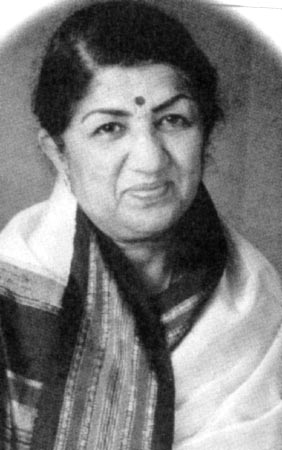
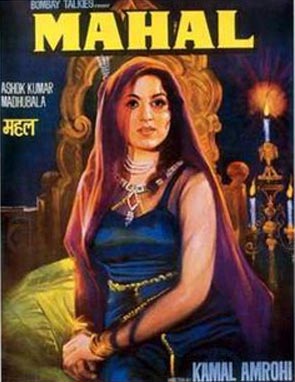
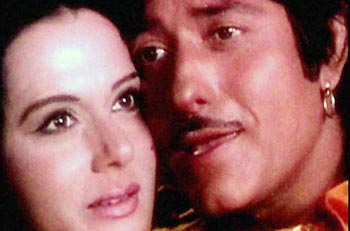
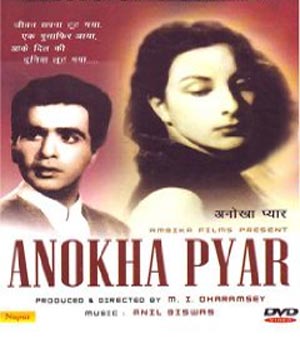
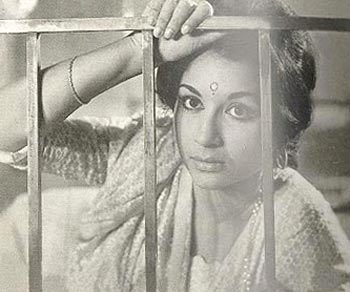
Comment
article